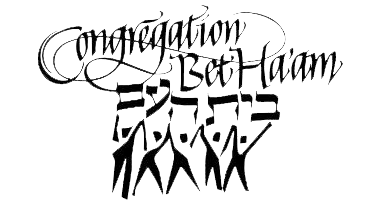by Lynn Urbach, President
It’s obvious, I know. Our homes and apartments are different now than they were six months ago or last year at this time. They have morphed from the place we sleep, eat, and spend time with family and friends to the center of our lives: our restaurant, movie theatre, gym, and school. But are they also for worship on High Holy Days? That’s challenging for me.
I look around tonight. I should be nervously standing in front of a few hundred people in a very large, beautiful sanctuary. I should be dressed in clothing and shoes that are neither natural nor comfortable for me.
Instead, I’m looking at a computer screen. A Brady Bunch-style checkerboard of people, of fellow worshippers.
Is this really Rosh Hashanah? How can I get my head into a spiritual place, examine my relationships with friends and colleagues, consider how I’ve acted this year? Can I worship?
For me, Rosh Hashanah and Yom Kippur are supposed to have a definite pattern. Dinner with friends and family, lighting candles, saying kiddush. Rushing to get to services. I like to get there early so I can sit near the front. The social hall and sanctuary bursting with humanity. Part of the experience is getting lost in a sea of people, my voice drowned out by others’ while also being part of something more.
This year, I don’t have that. My husband and I lit candles and said the Kiddush together, but alone.
There are some other differences. Our normal concerns with the High Holy Day logistics are things we expect; they happen every year. How far away will we have to park? Will there be enough books and will I find a seat I like?
This year, there are problems too, just different ones. They are difficult to anticipate because none of us have never done this before.
You may have already experienced some annoyances. How many of you were frantic in the past few hours because a you couldn’t find the link or forgot to borrow a book in advance? You couldn’t register or pick up a book if you waited until the last minute not because our staff, some of whom are Jewish, are home with their families for the holiday, not because they left early for the weekend. It’s because the logistics of organizing a webinar for several hundred people is new to them, just as this is new to all of us.
Mistakes will be made. I don’t know what the problems will be, but they will be. You might have had to wait too long in the waiting room because a too many people were entering at once. The waiting room is annoying. But Zoom bombing is real so we needed to register and to wait for Rachel, Ivan, or Chris to let us in. Our audio may get out of sync or be of poor quality. And think about this—here on the east coast, how many synagogues are having Zoom services right now, this very minute? The URJ warned Zoom to anticipate this. But it could well be that we have to turn off the video so we can at least listen because a there is too much traffic.
Right now, and for as long as this pandemic continues to threaten our very lives, we all deserve an extra dose of compassion, of kindness. Certainly for our staff and our rabbi, but also for ourselves, our families, our friends and co-workers. Let’s appreciate what we have, try to be gentle, kind, and express appreciation and gratitude often. It will be good for all of us.
Right now, we ARE together. We are with our community. Whether you are a member of Congregation Bet Ha’am, are looking into a computer here in Maine or have tuned in “from away” for this evening, we are fortunate to all be here together, celebrating, reflecting, praying, daydreaming. Together. Physically, yes, we are mostly in our own homes. But as we listen, read, sing, and pray along with Rabbi Saks and Sharon and others, tonight, tomorrow, in ten days, we are one, b’yachad, together.
Welcome to Bet Ha’am, our house of the people. On behalf of the Bet Ha’am Board of Trustees, welcome. We are glad to all be here together, with you.
Photo by Chris Montgomery on Unsplash

